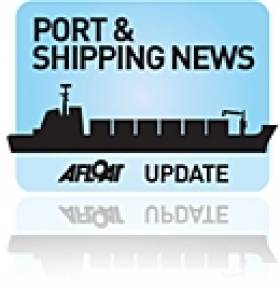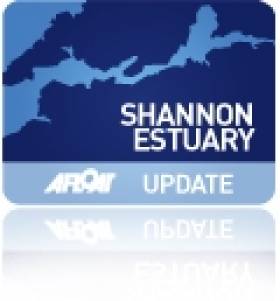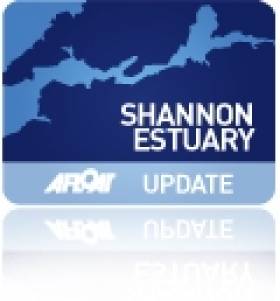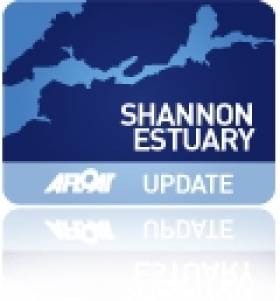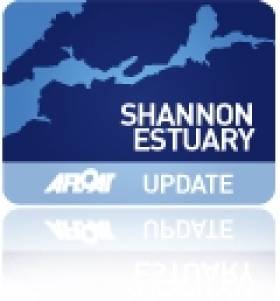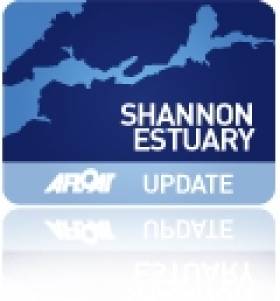Displaying items by tag: Shannon Foynes Port Company
Job Opportunity at Shannon Foynes Port for Business Development Executive
Shannon Foynes Port Company (SFPC) is currently recruiting for the position of Business Development Executive.
Shannon Foynes is Ireland’s second largest port operation, currently handling in excess of 11 million tonnes per annum.
The Shannon Estuary is Ireland’s main deep-water facility with a channel depth of in excess of 32 meters and a handling capacity for large vessels up to 200,000 deadweight tonnes (dwt).
Supporting large-scale capital-intensive industry, it is the largest dry bulk port in Ireland. SFPC annually facilitates trade valued at €8.5bn supporting circa 3,700 jobs.
The company’s customer base extends across many sectors including the industrial, energy, agricultural, recyclable and renewable sectors to name some. Consequently, it facilitates a diverse trade mix in the dry bulk, liquid bulk and break-bulk categories.
Importantly, SFPC not only facilitates the movement of trade within its port estate and estuary but is developing as a large-scale distribution and industrial hub.
The company plans to develop and expand its existing customer base by providing new and/or improved customer offerings and services. To this end, it is necessary to build stronger relationships with the customer base and work with them to develop mutually beneficial solutions/services and offerings.
Reporting directly to the Head of Business Development, the Business Development Executive is a new role tasked with developing and managing the existing and future customer base for all ports under the remit of the company.
The role requires an individual with the desire and ability to network nationally and internationally, and in doing so identify potential opportunities for the Shannon Estuary which they will develop in conjunction with the Business Manager and team.
This is a role which requires well-developed business development and customer relationship management skills. Sector-specific experience is not essential.
Full details of the role, including how to apply, can be found via the SFPC website HERE.
Shannon Foynes Port Company is fully committed to a policy of equality of opportunity and treatment in its employment practices, and is committed to employing best practice in recruiting staff.
ESB and Shannon Foynes Port Announce Support for Floating Offshore Wind Research at UCC
The ESB and Shannon Foynes Port have announced a funding collaboration for a €250k study at MaREI — the SFI Research Centre for Energy, Climate and Marine at University College Cork (UCC) — in the latest step towards helping Ireland to deliver floating offshore wind (FLOW) projects in the future.
Starting this month, the focus of the research will be to examine the requirements and identify potential sites for wet storage, which is the temporary offshore storage of floating offshore wind turbines in suitable areas prior to installation.
This is a key requirement for facilitating floating offshore wind, which will be a fundamental technology in Ireland reaching its offshore renewable targets.
Research will take place over two phases. The first phase will consist of understanding the key conditions and constraints associated with the development and identification of suitable wet storage sites, while phase two will focus on the technical challenges of designing sites in terms of the optimum layout and mooring configuration.
The aim of the study is to identify and inform considerations for the future FLOW industry that are required at an economic, environmental, societal and policy level in Ireland and also, to set a benchmark for best international practice through close academic and industry collaboration.
Ronan O’Flynn, ESB programme director for Green Atlantic @ Moneypoint said: “We understand the importance that floating offshore wind projects are going to play in both Ireland achieving its ambitious renewable energy targets and ESB delivering on our commitment to reach net zero by 2040.
“Research such as this, carried out by our partners MaREI and supported by Shannon Foynes Port, will help the entire industry to better understand what is required for crucial wet storage facilities that will allow floating offshore wind projects to be delivered at scale.”
‘This project will be an important enabler for the emerging floating wind energy sector in Ireland’
Pat Keating, CEO at Shannon Foynes Port said: “Our partnership with the ESB on funding this research will help underpin understanding in the key area of wet storage, in which [the] Shannon Estuary will be a major provider of as we go about harvesting the unprecedented opportunity for not just our region and State arising from floating offshore wind.
“Because of the estuary’s existing deepwater ports at Foynes and Moneypoint, wet storage space and available land for large-scale industrial development, we are one of few locations in Europe that can manufacture floating turbines at the scale necessary for commercialisation.”
Dr Jimmy Murphy, funded investigator in MaREI and senior lecturer in the School of Engineering in UCC, said: “This project will be an important enabler for the emerging floating wind energy sector in Ireland and will allow strategic planning decisions to be made related to the efficient deployment of floating windfarms.
“MaREI has a track record of research and development in floating wind and welcomes this collaboration with ESB and Shannon Foynes Port to address the challenge of identifying potential wet storage locations and optimising design layout.”
Ireland’s offshore wind energy potential arising from our Atlantic seaboard winds is among Europe’s leading renewable energy opportunities, the partners suggest.
With a maritime area more than seven times the size of its landmass, ideal wind conditions and strategic location on the Atlantic Ocean's edge, floating offshore wind generation has the potential to deliver up to 30 gigawatts of energy by 2050 — six times more than current domestic electricity demand.
MaREI will provide the research expertise along with the various tools required for the study which is aligned with their core research principles. ESB and Shannon Foynes Port will provide funding support and industry knowledge for the study which is in line with ESB’s Net Zero by 2040 strategy and Shannon Foynes Port’s Vision 2041 masterplan.
Shannon Foynes Port Company Hiring for Compliance Executive
Shannon Foynes Port Company is hiring for the position of compliance executive.
This full-time permanent role will report directly to the corporate and regulatory assurance officer with a base located at the company’s head office in Foynes, Co Limerick.
The successful candidate will demonstrate strong organisational skills in guiding and advising on audit, governance, compliance and risk management-related activities.
The compliance executive will be responsible for supporting the corporate and regulatory assurance officer to ensure that Shannon Foynes Port Company meets its significant compliance obligations, within deadlines and to the appropriate standards.
The closing date for applications is midnight on Friday 28 July.
Shannon Foynes Port CEO Welcomes Tender for Limerick to Foynes rail
The Shannon Estuary can become an international floating offshore wind and related green fuels generation hub, according to the Chief Executive of the Port Company, Pat Keating, who today welcomed the expression of interest’ tender for works on the 42km Limerick-Foynes rai line.
“The re-generation of the rail line is one of two transport links essential for delivering on the unprecedented opportunity for the estuary as a global floating offshore wind energy and transhipment hub. It will be of great benefit to the wider project, but even more essential is the road link to Foynes,” he said.
“The expression of interest tender is a very significant moment within our wider plans to capitalise on the unprecedented opportunity for the Shannon Estuary as it gives even greater certainty that this important rail connectivity is going to happen. This is a strategic move that will enhance connectivity to Foynes port but also help to decarbonise the supply chain by transferring significant cargo tonnages from road to rail. “However, the primary access to and from Foynes will still be road and it’s essential that the Foynes to Limerick road goes ahead as soon as possible. It will carry by far the majority of goods to and from Foynes, goods and materials that rail cannot accommodate. So, while we are delighted with an announcement regarding the reinstatement of rail, we look forward to an early commitment, too, on the Foynes to Limerick road,” he said.
“We appreciate the expediency regarding the rail reinstatement but it is essential, too, that we get moving on addressing our road infrastructure. Shannon Foynes is a Core Corridor Port under the EU’s Ten-t Regulations. These regulations require that upgraded hinterland connections, ie road and rail, are in place by 2030.
“The Shannon Estuary can become an international floating offshore wind and related green fuels generation hub, but our current road network links are an impediment to that. We must move quickly, however, as time is not on our side when it comes to energy security and climate change. The Estuary can be an enabler for addressing those critical issues for not just Ireland but Europe, with transformative economic as well as environmental impact, but it won’t happen without the necessary infrastructure,” he said.
Mr Keating added that the rail project is also very much endorsed at European level. “In 2015 we secured €800,000 from the EU’s Connecting Europe Facility for a Feasibility and Detailed Design study, including all associated consenting requirements, for the regeneration of the rail link in 2015. Those works were completed in 2019 and were part funded also by Shannon Foynes Port Company and undertaken by Irish Rail. As a result, the reinstatement of the 40kms Limerick to Foynes line is now shovel-ready, so moving to this next ‘expressions of interest’ stage to realise this opportunity is a key moment.”
EU Funding For Irish Port Projects Will Bring Significant Infrastructural Benefits - Donohoe
#IrishPorts - Transport Minister Paschal Donohoe has today (Friday 10 July) welcomed the announcement by the European Commission that a number of projects – including developments across three Irish ports – have been recommended for co-funding under the Connecting Europe Facility (CEF).
"This is good news and a further boost for infrastructure investment in Ireland," said Minister Donohoe. "The recommendation by the European Commission in respect of these five projects is a positive step in the development of these key infrastructural projects which will allow for future growth and development which will ultimately help with job creation.
“I was particularly delighted to support the port companies in their applications. Ireland’s National Ports Policy categorises the Port of Cork Company, Dublin Port Company and Shannon Foynes Port Company as Ports of National Significance (Tier 1) in recognition of the key role of they play in national economic development.
"This positive announcement will support significant, planned investment by the ports and follows the news that the Ringaskiddy project in the Port of Cork has recently been granted planning permission, while just today the Alexander Basin Redevelopment Project received a positive planning decision from An Bord Pleanála, allowing the largest ever infrastructure development project to be carried out at Dublin Port.
"In addition, Shannon Foynes Port Company’s first major project, the redevelopment of the East Jetty, is now well underway having commenced earlier this year. The continued commercial development of the port companies is a key strategic objective of the Government which will support job creation across the country as they are progressed in the years to come.”
The five projects are as follows:
· Port of Cork, Ringaskiddy Project (Project Type: Works, Co-funding rate: 17.47%, EU Max Contribution: €12,736,001.10)
· Shannon Foynes Port Company, Jetty Enhancement for Sea Port (Works, 20%, €2,200,000)
· Shannon Foynes Port Company, Connecting International Sea Cargo to the Irish Rail Network (Study, 50%, €800,000)
· Dublin Port, Alexandra Basin Redevelopment Project (Works, 10.3%, €22,782,055)
· City Centre Re-signalling Project (Works, 30%, €17,586,760.20)
#ShannonFoynes - The Limerick Leader reports on the Shannon Foynes Port Company's announcement of record profits in 2013.
Ireland's second largest bulk port company declared a 35% increase in its operating profits in the 12 months since its 2012 annual report, a record rise for the fourth successive year.
According to the port's CEO Patrick Keating, this strong performance underlines the objectives of the Vision 2041 master plan for the Shannon Estuary launched last year.
The Limerick Leader has more on the story HERE.
Shannon Foynes Posts Record Profits
#ShannonPortProfit – Record financial profits by Shannon Foynes Port Company (SFPC) is down to an increase in shipping activity levels not seen since 2008.
SFPC posted an operating profit of just over €3 million for 2012, which after financing costs and net disposal proceeds amounted to just over €2 million.
Operating profit represents a 6.6 per cent rise on 2011 performance. The Irish Times has more on this story.
Master Plan for Shannon Estuary Launched
#Shannon - The Shannon Foynes Port Company has launched its master plan for the development of port infrastructure and services along the Shannon Estuary.
RTÉ News reports on the 30-year plan, titled Vision 2041, which will involve the construction of a new deepwater birth at Foynes, the development of warehousing and facilities across 300 acres of additional land - and the potential reopening of the Foynes-Limerick railway line, which has lain dormant since 2001.
As one of the deepest waterways in Europe, the estuary is also in prime position to take advantage of the new 'post-panamax' supertanker shipping era, and talks on securing future foreign direct investment as a priority.
As previously reported on Afloat.ie, submissions for the accompanying strategic plan for the development and management of marine-related industry and tourism in the Shannon Estuary region closed last week.
The Draft Strategic Integrated Framework Plan (SIFP) for the Shannon Estuary, the first of its type to be developed in Ireland, identifies a number of strategic sites along the estuary for future possible development in the areas of industry, tourism, energy, fishing and aquaculture and marine-related industry.
Shannon Foynes Port Company Records €2.9m Profit
#SHANNON FOYNES – An operating profit close to €2.9m for last year (up from €2.5m in 2011) was recorded by Shannon Foynes Port Company (SFPC) according to yesterday's Irish Times.
SFPC recorded a 2.2 per cent rise in turnover to €10.1 million, resulting in a 13 per cent increase in operating margin from 25.5 per cent to 28.1 per cent, according to the 2011 annual report.
The company made a profit attributable to the shareholder of €2.73 million after exceptional items and financing. Cargo increased 8 per cent to 10.1 million tonnes from 9.4 million tonnes in 2010. About 35 per cent of Ireland's bulk traffic transits through SFPC's six terminals on the estuary.
Foynes Hosts Emergency Ship Fire Drills
#SHANNON ESTUARY – The Maritime Journal reports that a simulated fire and rescue drill simulating a fire on board a ship took place in Foynes Port this week.
Limerick County Fire & Rescue Service with the assistance of Shannon Foynes Port Company and Celtic Tugs which operates a fleet of tugs in the port hosted the Ship and Ports Course.
A number of exercises were carried out during the course, to read more on the exercise click HERE.


























